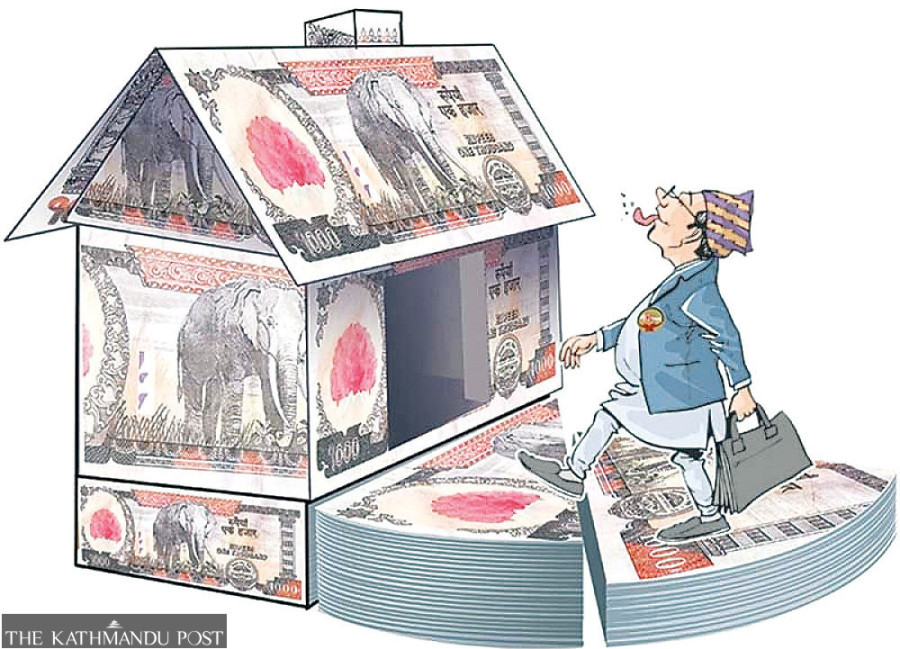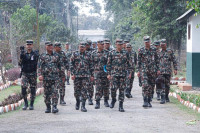National
MPs criticise court order on constituency development fund
Constitutional experts, however, disagree with the lawmakers’ criticism.
Nishan Khatiwada
Some lawmakers from the ruling as well as opposition parties have criticised the Supreme Court for its interim order to halt the implementation of the Constituency Infrastructure Development Programme, commonly known as the Constituency Development Fund.
Speaking at a House of Representatives meeting on Thursday, Shyam Kumar Ghimire, a Nepali Congress lawmaker, claimed the Supreme Court has breached its jurisdiction and infringed upon the legislature’s lawmaking authority.
The Supreme Court on Wednesday had halted the implementation of the controversial Constituency Infrastructure Development Programme at both federal and the provincial levels.
Responding to a writ petition filed by advocates Trilok Bahadur Chand and Yagya Prasad Adhikari, a constitutional bench of the newly-appointed Chief Justice Bishowambher Prasad Shrestha, Ishwar Prasad Khatiwada, Ananda Mohan Bhattarai, Anil Kumar Sinha and Prakash Man Singh Raut issued an interim order in the name of both federal and provincial governments asking them not to implement the programme.
“Making laws and passing the budget falls under the parliament’s jurisdiction. No one can violate these rights,” Ghimire said in the House meeting on Thursday. “Neither the executive nor the judiciary have the rights to take out a part of the budget [that has been prepared as part of the Financial Bill] out and split it as they wish.”
On Wedensday’s court order, the provincial governments have also been ordered not to implement similar programmes in all the seven provinces.
The federal government reintroduced the pork barrel fund after a gap of two years. Likewise, the provincial governments also reintroduced similar programmes as per the demand of the provincial lawmakers.
Nepali Congress Chief Whip Ramesh Lekhak told a group of journalists that the executive, legislature and judiciary should work within their jurisdictions. “It [the court order] is judicial activism,” Lekhak said. “Judicial activism has ended democracy in many nations. Our court should also be well aware of it.”
In its order, the Supreme Court has also questioned whether lawmakers should undertake tasks that the executive bodies are supposed to handle.
Even the opposition lawmakers criticised the court’s interim order.
“The sovereign parliament has passed the budget and made laws related to it. It is the parliament’s prerogative,” said CPN-UML lawmaker Surya Thapa at the House meeting. “Judicial activism is intolerable. Parliament should seek the remedy in an appropriate way in this matter.”
The court order states that Nepal’s constitution has adopted a democratic governance system based on the separation of powers and Article 75 of the constitution has granted executive authority to the federal Cabinet, while Article 162 has granted executive authority to the provincial Cabinet.
“Performing legislative work is the main task of the federal and provincial legislatures,” the court observed. “No authority has been granted [by the Constitution] to federal and provincial legislatures to perform executive tasks.”
Lekhak, however, disagreed. He said it is not the legislature that would implement the fund but the executive. “Lawmakers can make requests to the executive to do a certain type of work in their constituency,” he said. “But the court’s order has been written in a way as if the parliament implements the fund.”
The court’s latest order is an example of “judicial activism”, Radheshyam Adhikari, a former lawmaker at the National Assembly, told the Post on Wednesday, “especially as lawmakers pushed for the reintroduction of the programme, which remains largely unpopular among the public.”
Adhikari, however, added that the Supreme Court has the authority to decide whether the Constituency Infrastructure Development Programme is against the letter and spirit of the constitution.
Amid intense pressure from federal lawmakers, the government was forced to reintroduce the programme and allocate Rs50 million to each of the 165 federal constituencies. Under the programme, a minimum of Rs10 million has been allocated for each project across various sectors, including road construction, irrigation, water supply, education, health, tourism, and sports. This year’s budget has set aside a total of Rs8.25 billion under the programme.
Legal experts, however, disagree with the lawmakers.
Bhimarjun Acharya, a constitutional expert, said alongside separation of power there is another principle—balance of power. “Judiciary can also review the work done by the parliament. The fund’s repeated misuse might have prompted the court to issue the interim order,” Acharya said. “Though the judiciary also has some jurisdictional limits, we cannot term this decision judicial activism.”
The scheme has sparked controversies because of unrestrained power enjoyed by lawmakers in selecting projects and over their alleged misuse of such funds. It was discontinued by the federal government for two years, with the funds diverted to the fight against Covid-19. Provinces, however, continued with the programme.
Dinesh Tripathi, another constitutional expert, said it is the duty of the court to check the steps of the state organs that are against the spirit of the constitution. “The funds have been misused and the lawmakers have been portrayed as development agents,” Tripathi said. “The programme has also hit the rights of the local levels.”




 11.73°C Kathmandu
11.73°C Kathmandu













